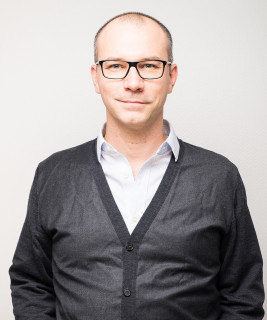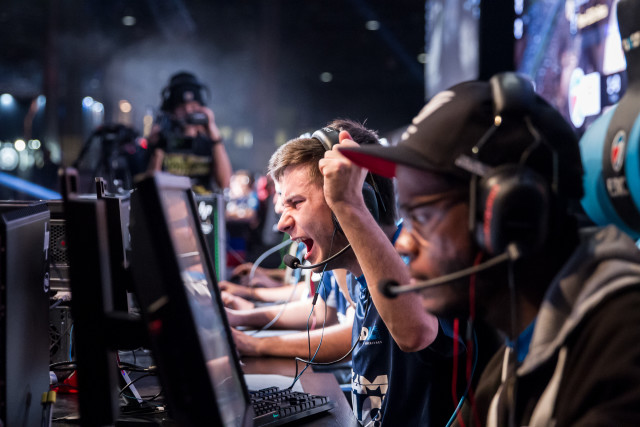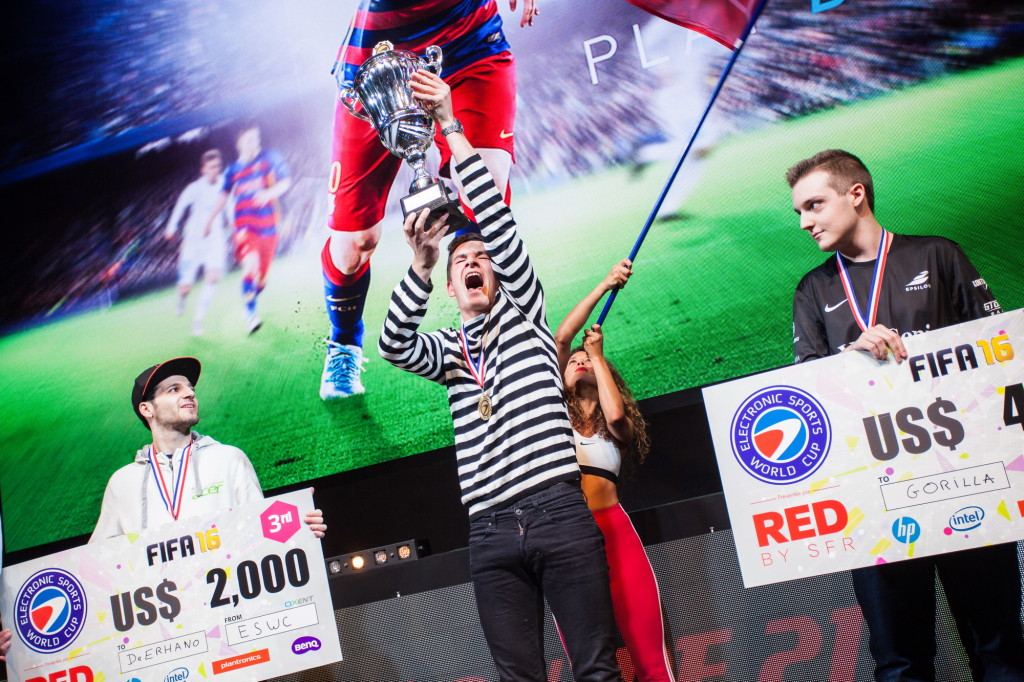After 13 years of running the Electronic Sports World Cup (ESWC), French parent company Oxent has re-positioned its brand to become an eSports convention rather than a stand-alone league. The move comes as major companies such as Electronic Arts and Activision Blizzard bring eSports internally. ESWC is working with Activision Blizzard on the Call of Duty World League for the Paris tour stop May 6-8.
The company is also expanding its competition to Korea with ESWC Korea June 24-26 on Jeju Island. And it will return for its sixth Paris Games Week event in October. Matthieu Dallon, co-founder and CEO of Oxent and creator of the ESWC, explains what the corporate change opens up for game makers, sponsors, and brands in this exclusive interview.
 How have you seen eSports evolve in the 13 years since ESWC launched?
How have you seen eSports evolve in the 13 years since ESWC launched?
ESports values haven’t changed. What motivates the champions, their coaches, and the spectators hasn’t moved an inch. All the intensity you see today was already there in the competitions in the 2000s.
The professional ecosystem has developed, though. It started from nothing, and now it’s the most fantastic segment in entertainment, involving the biggest players in tech, IP management, media, and sports from around the world. Now we have to engage institutions and schools on a local level to have complete vertical coverage, just like with traditional sports.
The rise of eSports is undeniably part of the digital revolution that society is going through today. I’m actually convinced that eSports is the logical outcome of the digital revolution.
What has been the key to your organization’s longevity in the eSports market over time?
That’s a tough question, because looking into the keys to longevity means having to figure out what both the successes and the failures have in common. By way of example, I’ll say that today I still work with the same people I hired 16 years ago. We’re an agile team, very close, and driven by some ideals for electronic sports. We’ve been able to adapt to each period by trying to avoid resistance to change.
You can see that in the range of games we’ve chosen. Today we can produce the best competition in the world for both Call of Duty and Just Dance. We took risks with innovative event set-ups and stages that made eSports history, like 10 years ago at Paris Bercy, in 2006.
We’ve always had a policy of being genuinely open and international. Offline, we’ve brought together players from the US, Europe, and countries like Iran, South Africa, and Mongolia for example, mixing men and women as much as possible.
What opportunities has the recent integration of eSports internally at publishers such as Electronic Arts and Activision Blizzard opened up for your company?
The integration of eSports value creation by the rights-holders means, first of all, that we are going to enter a cycle where independent competition brands will disappear. And our branding as a “Convention’”is a clear consequence.
It also means that companies that generate billions of dollars each year are going to be competing with each other trying to provide the best eSports experience possible, for both the players and the spectators. The eSports market is going to get a lot bigger and more dynamic. There’s going to be an incredible increase in innovation in games and production value in eSports, which will propel the entire ecosystem upwards.
What opportunities has the sale of MLG assets to Activision Blizzard opened up to your company?
I think that Activision Blizzard will do excellent work, and I hope that the former MLG team will fully accomplish their vision, now that they’re at the core-level of things. I’m proud to be working with them on our next event.
How do you see your company evolving this year with the new name?
The main business for our company, Oxent, is developing the Toornament.com eSports platform, which involves 70 percent of our resources. At the same time we produce ESWC events with the objective of becoming the “Comic-Con” of eSports, open to all IPs and competitions. This new approach is letting us organize an event for Call of Duty fans in Paris in May as part of the COD World League. We also have other projects in the pipeline with Blizzard and Ubisoft.
This new positioning of the ESWC brand, and the new approach to the market, converges with our policy of developing Toornament, which is a platform open to all competitions and games.

What do you feel you offer that an ESL or Gfinity doesn’t when it comes to reach and specialties?
As far as the ESWC is concerned, I think that one of the important differences lies in our being open to teams and players from around the world, who get then the opportunity to challenge the famous top pro-teams.
But the main difference is in our Toornament project. We publish an open platform that can be accessed as SaaS and through APIs by the entire industry, which ESL and Gfinity could also use, by the way. We finished the beta phase six months ago and we already federate over 20,000 tournament organizers in more than 100 countries.
We’ve seen your company put a focus on female eSports that stands out. What role do you see female eSports playing for your company moving forward?
The decision to open up competitions to women, or to encourage a mix in tournaments and events, is not a corporate strategy. First of all, it’s an ethical question that plays a role in our vision of eSports, and it’s also a social question that motivates us every day. ESports cannot be men-only. Today, most games are designed by men for a male market. I think that will change. And if we can contribute to that change, we will be proud to do so.
How have you seen the Paris eSports community specifically grow?
The ESWC has led the way in helping the French public learn about eSports. The mainstream media have largely covered the phenomenon for years, from every possible angle. We have two TV channels dedicated to gaming and the Paris Games Week, which is today the third biggest trade show for video games in the world with over 300,000 visitors each year; where ESWC plays a major role. So in France, there are a lot of fans eager for eSports, and it guarantees a unique atmosphere.
What opportunities do you see for your brand in Korea, the Mecca of eSports?
First of all, it’s a symbol. One of the reasons I became a committed eSports professional was the first WCG in Korea in 2001, where I was managing the French team and a certain ElkY, who was beaten in the final by SlayerS_Boxer on StarCraft.
Today, organizing international tournaments in Korea in partnership with Blizzard will enable the ESWC to spread throughout Asia. In Korea we’ve been working with a partner for quite some time, ESGames (http://esgames.co.kr/), who is also active in the Chinese market. We have a lot to learn from their maturity and the way eSports can contribute to culture and education.
Are there plans to expand into other countries as well?
Yes. In 2017 we should be in a position to announce events on every continent. Now that we are no longer restricted to the calendar of only one world cup per year, it’s easier for us to adapt to local markets, with different games and at different times of the year. For 13 years we built up a network of ESWC affiliates in over 70 countries, limited to national operations. The most ambitious of them, and there are a lot, now hope to develop international productions with the best players in the world, and the ESWC brand will help them.
Where do you see your company five years from now?
Pipedream scenario: thanks to the Toornament project, sometime in the next two years Oxent is acquired by Disney, in order to develop the new eSports ESPN using data from hundreds of thousands of tournaments. The ESWC becomes the leading annual convention, which no IP holder can afford not to take part in. I stay at the helm for two more years to ensure the objectives of the acquisition are fully achieved. Then, free of any non-competition commitment, in 2020 I join the Paris 2024 Olympic Organizing Committee to supervise the integration of the new eSports disciplines.

